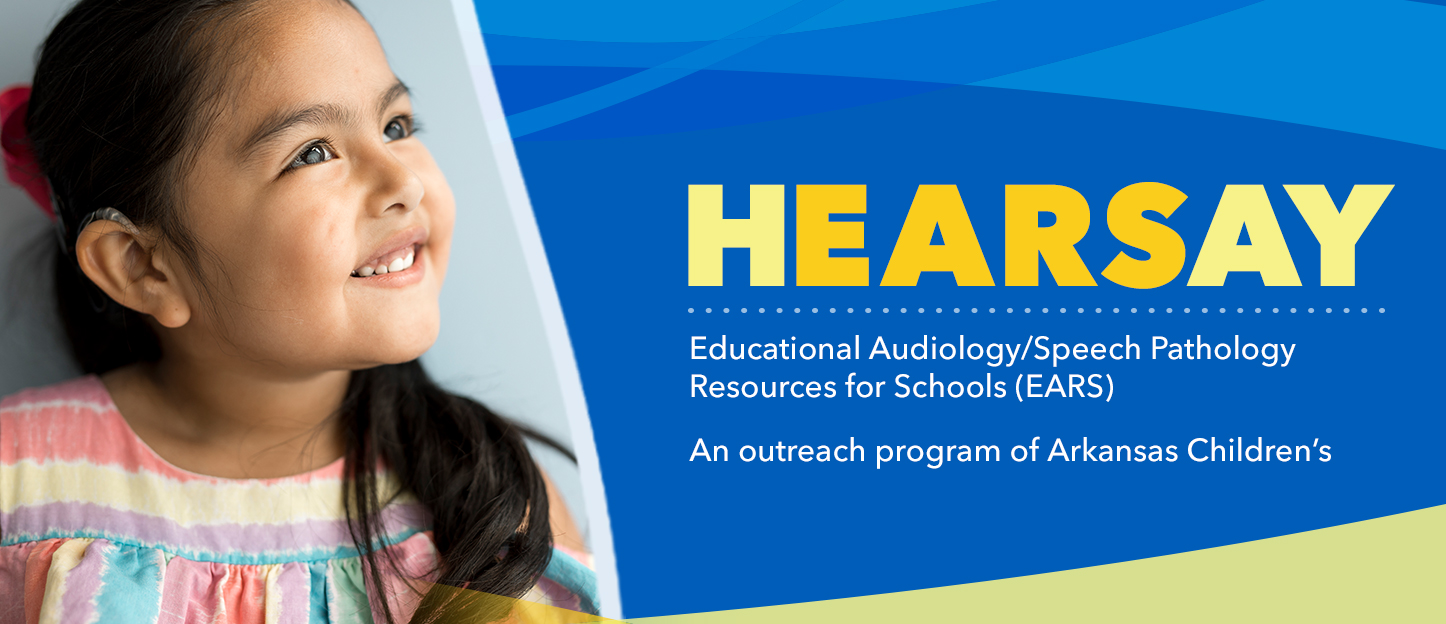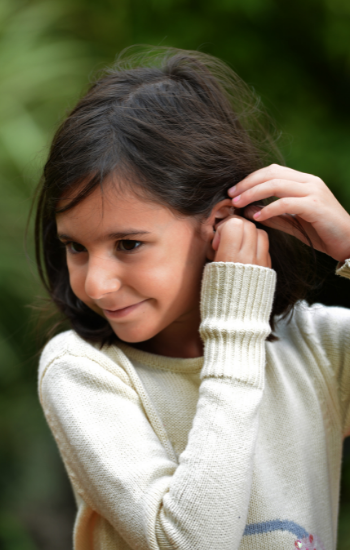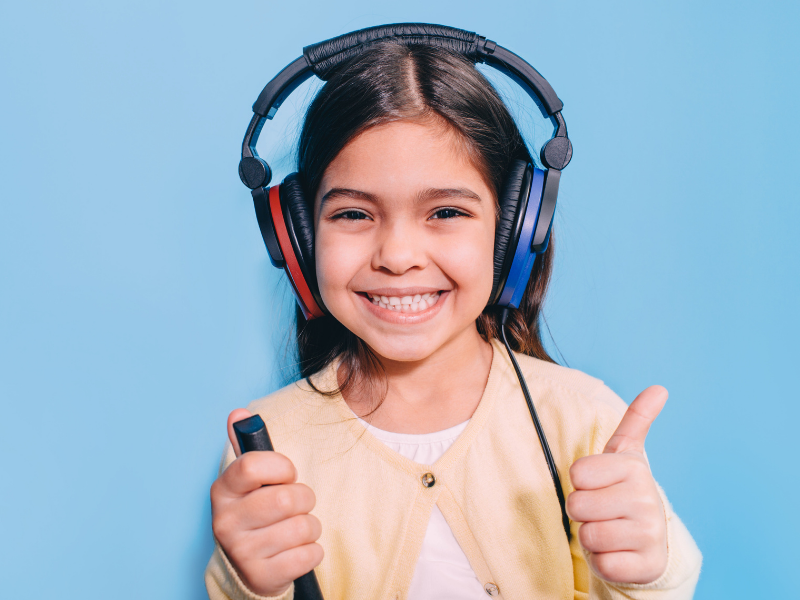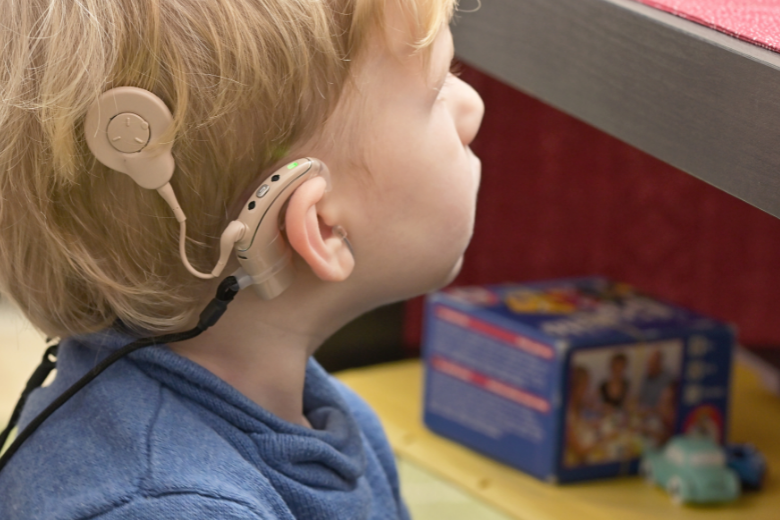HEARSAY is a quarterly newsletter generated by the EARS Program at Arkansas Children’s Hospital. Below are the full articles linked from our most recent e-newsletter.
Student Spotlight
During the first year of HEARSAY, EARS featured a student spotlight section to highlight a student who is D/HH and to celebrate the student’s success. Our intent was to feature at least one student each school year. In this issue of HEARSAY, we are making up for lost time and highlighting not one, not two, but three students and the work of the Teacher of the Deaf (ToD) at their school. Allow us to introduce, Connor (1st), Isaiah (1st), and Langstyn (K).
 Jamie Jenkins is the Teacher of the Deaf (ToD) in their school district. One of the more striking, lasting impressions you encounter when meeting Ms. Jenkins and seeing her students interact is the sense of community and belonging you feel amongst them. Peer relationships, in particular those with other students who are also D/HH, are extremely important for our students who are D/HH. Ms. Jenkin’s comments, “Building a community for Deaf and hard of hearing students is top priority for me.” And that is very evident. Throughout the school year, Ms. Jenkins creates and displays materials in her classroom and adjacent hallway to educate her students about their hearing loss, hearing devices, and much more. Pictured here is the hallway outside Ms. Jenkin’s classroom decorated for the Holiday Season. Each reindeer’s antlers hold pictures of the different types of hearing devices each of the boys wear and use in the classroom. What a fun way for her students and others in the school to learn about hearing loss and hearing devices! Here’s what Ms. Jenkins has to say about her role as a ToD, “I love being on the front row seat…watching the boys take ownership of their hearing levels and using those Expanded Core Curriculum skills in everyday language puts a smile on my face and incentive in my soul! Watching the boys greet each other with a sense of belonging, talking about their [hearing] devices and strategies for communication…ohhh that encourages me to keep on keeping on.”
Jamie Jenkins is the Teacher of the Deaf (ToD) in their school district. One of the more striking, lasting impressions you encounter when meeting Ms. Jenkins and seeing her students interact is the sense of community and belonging you feel amongst them. Peer relationships, in particular those with other students who are also D/HH, are extremely important for our students who are D/HH. Ms. Jenkin’s comments, “Building a community for Deaf and hard of hearing students is top priority for me.” And that is very evident. Throughout the school year, Ms. Jenkins creates and displays materials in her classroom and adjacent hallway to educate her students about their hearing loss, hearing devices, and much more. Pictured here is the hallway outside Ms. Jenkin’s classroom decorated for the Holiday Season. Each reindeer’s antlers hold pictures of the different types of hearing devices each of the boys wear and use in the classroom. What a fun way for her students and others in the school to learn about hearing loss and hearing devices! Here’s what Ms. Jenkins has to say about her role as a ToD, “I love being on the front row seat…watching the boys take ownership of their hearing levels and using those Expanded Core Curriculum skills in everyday language puts a smile on my face and incentive in my soul! Watching the boys greet each other with a sense of belonging, talking about their [hearing] devices and strategies for communication…ohhh that encourages me to keep on keeping on.”
- Connor’s favorite subjects are P.E. and Math, and it's a good thing because Connor says if he could be the world’s expert on any subject it would be Math. Connor looks up to his mom because she values communicating with him and talks with him every day. Connor says the best part of his hearing aids is that sometimes he is so comfortable in them he doesn’t feel like he is wearing them.
- Isaiah’s favorite subject is advocacy about his ears; and if he could be the world’s expert on any subject, it would be how people hear. We may have a future audiologist or otologist on our hands! Isaiah’s favorite Superhero is Aquaman because they look the same!
- Langstyn’s favorite subject is Computer Class. His favorite Superhero is Spiderman because he can dress up like him. He looks up to his classroom teacher Ms. Musto. Langstyn says the best part of his Bone Anchored Hearing Aid (BAHA) is that it helps him to hear better.






 in the classroom. Aided testing (with cochlear implants on) is the best representation of hearing status for students who wear cochlear implants, and this process is completed with their clinical audiologist. The EARS team is unable to perform aided testing at the school due to the need for a sound booth and speakers. Therefore, it is recommended that students with cochlear implants schedule an appointment with their clinical audiologist for their annual hearing evaluation. If the student is seen at Arkansas Children’s, the EARS team can share a copy of that evaluation with school staff with the appropriate signed release of information. The report written by the student’s clinical audiologist will be sufficient to replace the request for an annual hearing test for a student with a cochlear implant.
in the classroom. Aided testing (with cochlear implants on) is the best representation of hearing status for students who wear cochlear implants, and this process is completed with their clinical audiologist. The EARS team is unable to perform aided testing at the school due to the need for a sound booth and speakers. Therefore, it is recommended that students with cochlear implants schedule an appointment with their clinical audiologist for their annual hearing evaluation. If the student is seen at Arkansas Children’s, the EARS team can share a copy of that evaluation with school staff with the appropriate signed release of information. The report written by the student’s clinical audiologist will be sufficient to replace the request for an annual hearing test for a student with a cochlear implant.